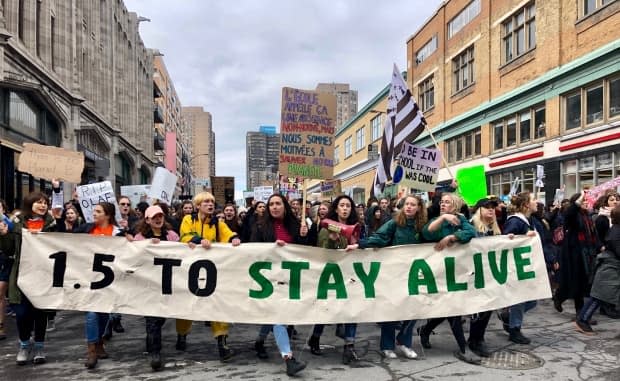Experts optimistic amid predictions in new report that Canada will miss emission targets
Climate Transparency's new report on G20 countries meeting their climate goals found that — contrary to Prime Minister Justin Trudeau's claims that Canada would meet its targets — Canada is one of the bottom three countries set to do so. But some experts say there's hope for the country yet.
Canada's climate targets are laid out in its Pan-Canadian Framework on Clean Growth and Climate Change. In particular, the federal government has stated that by 2030, it will have reduced carbon dioxide emissions by 30 per cent from 2005 levels.
However, the new report, the G20 Brown to Green Report 2019, found that not only has Canada's emissions increased by 17 per cent between 1990 and 2016, it will also miss its 2050 target to reduce emissions by 80 per cent from 2005 levels.
"I'm not surprised," said Dianne Saxe, former environmental commissioner of Ontario. "We've known for some time that Canada is not on track to meet our existing 2030 target and that our existing 2030 target is far too weak."
But Saxe said the Pan-Canadian Framework is just that: a framework.
"The Pan-Canadian Framework was always meant to be just the first step. It was never going to get us even to our current 2030 target, which we know is much too weak to stay within a 1.5- or 2-degree framework," Saxe said. "It's much too weak for the kind of future we'd like our kids to live in. It was meant to be just an opening bid."

Despite it being an "opening bid," the federal government has some challenges ahead if it hopes to adopt stronger climate policies, including a minority government where not all parties agree on a climate change plan.
"There are a number of policy areas where it is really jurisdictionally complex, because there are sub-national and federal jurisdictions that overlap," said Teika Newton, membership and domestic policy manager for Climate Action Network Canada, who was involved with providing data for the new report.
We need to figure out ways of getting provinces and territories and the federal government to all be pulling in the same direction. - Teika Newton of Climate Action Network Canada
Another challenge, she said, is buildings. While the federal government has plans to have new building codes in place by 2025, provinces and territories will have the final say as to whether or not they will adopt them.
And this is one of the hurdles Canada faces as it tries to reach its 2030 — or even 2050 — targets.
"We need to figure out ways of getting provinces and territories and the federal government to all be pulling in the same direction," Newton said.
Promising steps
The G20 report wasn't all bad. In fact, the federal government was given credit for its carbon tax as well as the new Canadian Energy Regulator Act that will oversee the energy sector. But it was critical of the government's purchase of the Trans Mountain pipeline.
In Canada, there are criticisms on both sides of the carbon tax debate. The Conservatives have said they don't support a consumer carbon tax, saying it costs consumers, even though they get a rebate at tax time.
And on the other side, many experts feel that the federal government's plan to increase it annually until it reaches $50 a tonne isn't enough to make a real dent in CO2 emissions.

But there is one other notable step Canada has taken, and which the new report acknowledges: the Just Transition for Canadian Coal Power Workers and Communities, an effort to make the move from coal to renewables, such as wind and solar power.
A task force was assembled with its final findings released in December 2018. It not only involved experts from various disciplines, including the coal industry, labour and electricity, but it also consulted with workers in the oil and coal industry, who face an uncertain future with a move to renewables. It's something that Newton said is an extremely positive step in the right direction. And something that, if followed, will make a difference to Canada reaching its targets in the future.
"[It's] the longer-term planning and visioning for a pathway that actually gets us to our targets," she said.
"If those [recommendations] are followed, it could lead to a lot of benefit for workers in Canada, and I think a lot of economic benefit for the country as a whole, because it's the sort of work that's needed to ensure that there's stability and trust and certainty in the direction that Canada is taking."
Newton said she's optimistic that the near future holds more planning and more positive change for Canada — changes that would see Canada get closer to reaching that 2030 emissions target.
"We've seen people engage on climate change in ways that I don't think I even dreamed was possible at the beginning of this year," she said. "That gives me so much hope. And if that is the constituency that is holding decision-makers' feet to the fire, then yes, I think we can get there."


